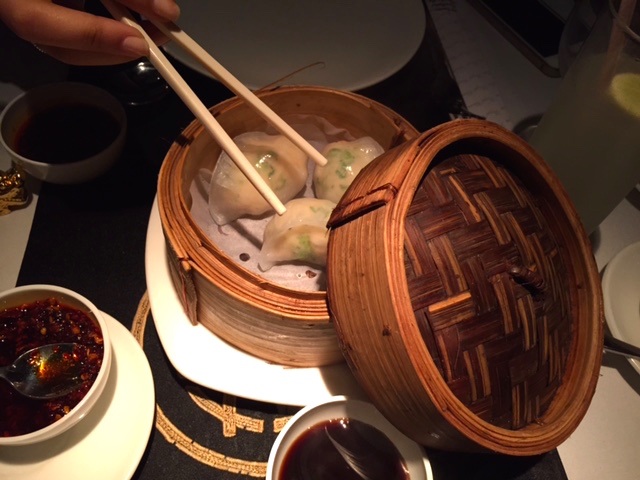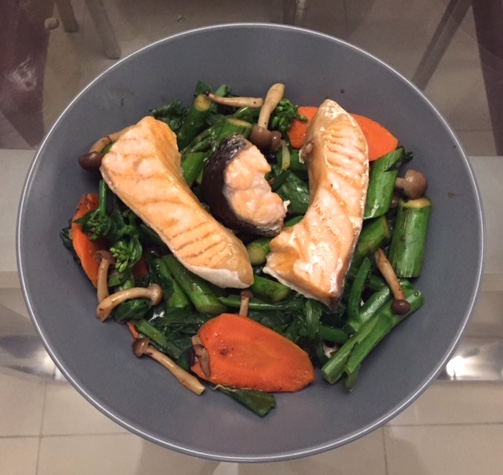Hey guys! I can’t believe how quickly these past 2 weeks have flown by and my trip to Guangzhou is coming to a close. I feel an onset of separation anxiety already creeping up at the thought of saying goodbye to Sameer…thank the lawd for FaceTime, even if I’m the one doing all the talking ;)!

Nephew aside, I’m also going to miss the food here. All the delicious greens, stir-fries, seafood, noodles, dim sum, I totally embraced Oriental food. Speaking of food, I had a few conversations during my trip about how Chinese people stay slim & healthy despite the food traditionally eaten…especially given how most of it is frowned upon in the West:
- White rice: Refined carbs are believed to cause abdominal weight gain & diabetes
- Pork: High-fat red meats tend to be high in saturated fat which affects heart health
- Soy sauce: Full of gluten & sodium
I wrote a similar post on How French Women Stay Slim last year and it’s interesting how different cultures have in-built eating habits that make healthy living work for them, rather than vice versa. While I could be wrong, these are merely my observations on how Chinese people stay slim & healthy:
- Cooking methods: While I’ve seen a few deep-fried dishes on restaurant menus, most of the options are steamed, sautéed, pan-fried, or boiled.

- Size of crockery: Chinese crockery seems to help with instant portion bowl- for example, a rice bowl holds ¼ – 1/3 the volume that an American bowl would hold. Even the takeaway portions have been noticeably smaller (but filling enough) than I would even get in London…so you can only imagine how they measure up to American portion sizes.
- Excessive tea consumption during/between meals: While I remain skeptic about the claims that green/Chinese tea burns fat, it does certainly help fill you up for zero calories. Often times, hunger is masked as dehydration which leads to unnecessary overeating. Also while tea is drunk all day, the idea of adding milk/cream/sugar or eating a side of biscuits is not really a done thing.

- Use of chopsticks as cutlery: Expert or not, there’s only so much you can fit in each bite. Along with portion size, this also helps with pacing your meal, and it’s no surprise that eating slower can help reduce the risk of overeating: it usually takes up to 20 minutes for the brain to process feelings of fullness.
- Ordering style is almost always family-style i.e. sharing of dishes. This automatically gives diners a variety of both healthy and not-so-healthy dishes. Even if fried rice contains more oil than steamed rice, pairing it with sautéed greens & a some steamed fish helps balance out the overall meal.
While there is no perfect diet, I think it’s safe to say that shunning certain foods/cuisines completely is a bit ridiculous. Food needs to be taken into context in terms of what the rest of the individual’s diet consists of, portion size & method of preparation. Despite the bad rep Chinese food tends to receive, clearly we can learn a thing or 2 from this culture’s style of eating.
How does your culture approach food/diet?
Are there any foods that receive a bad rep which you still eat?

I also believe the Americanized version of Chinese food is just that, Americanized and it isn’t anywhere near authentic Chinese food. Here in the States we have a real issue with portion control. Restaurants give us giant portions because other wise we don’t seem to be satisfied, which is crazy, and leads to a tremendous amount of overeating. We’ve got some real bad habits here and not surprising a big obesity problem. I think we need to stop and learn from other food cultures as opposed to scoff or shun them.
Your nephew is adorable, and I understand the separation. One of mine is in Buffalo (three hours away) and the other is in Brussels (half a day away). The struggle is real.
You’re so right about “Americanising” Chinese food- it really takes away from the essence of the actual food. The same goes for “Westernising” Indian food – chicken korma is just so wrong. That’s awesome that you have family in Brussels- have you visited?
Yeah, we went two years ago for a week, and he comes stateside every year during the summer and at Christmas. I’m hoping to go back once the Hubby is done with school.
thank gawd for facetime – i second that. sameer looks adorable and hes growing up so fast….people probably walk more than here? have you noticed anything in terms of physical activity besides their balanced approach to food.
Unlike India or Dubai, I found Guangzhou to being a very walk-friendly city which I loved. Then again, I feel the same about the US & UK too – it’s so easy to be active without formally exercising.
Aww, Sameer is the cutest! Isn’t being an auntie amazing?? These are definitely some good points here – the chopsticks and portion size for bowls makes a whole lot of sense. I also am a firm believer that we are much less likely to have food affect us negatively if we don’t think of it negatively, no matter what we eat.
I completely agree- our minds are more powerful than we give them credit.
ExTremely well written. One fact I want to correct since I lived in HK, they do eat a lot of bakes and cakes at teatime – egg custard tarts to steamed sponge cakes.
That’s interesting about Hong Kong life. From what I understood, the 3-square-meal approach seemed more popular! I guess with any country, we can’t generalise :)!
Great post. I never thought about the chopsticks thing but it makes a lot of sense. And sharing food also means you’re not challenging yourself to finish a whole dish because you want to leave some for others to enjoy. Have you read the China Study?
Hayley
Thanks Hayley! I haven’t fully read the China Study but I’ve read a few points covered- would you recommend it?
I tried eating with chopsticks on a few occasions and it was kind of a nightmare I definitely need a lot more practice, but I’m thinking I should probably do it when I’m not hungry… or when the food doesn’t smell particularly appetizing
I definitely need a lot more practice, but I’m thinking I should probably do it when I’m not hungry… or when the food doesn’t smell particularly appetizing  You definitely raise a lot of good points, though, and I think another huge factor is all the chemicals and processing that goes into a lot of the foods that Western cultures eat. We don’t even know how that stuff affects our bodies, and from the evidence? It’s not doing us any favours!
You definitely raise a lot of good points, though, and I think another huge factor is all the chemicals and processing that goes into a lot of the foods that Western cultures eat. We don’t even know how that stuff affects our bodies, and from the evidence? It’s not doing us any favours!
Yes yes yes- real food all the way! No matter how “gluten-free”, “low-cal”, “vegan” etc etc, a product is, anything heavily processed is inevitably going to affect hormonal activity.
Your nephew is the cutest!
Good insight in this post – your points are spot on! I also want to add that I think Americanized Chinese food is probably a lot different (ie. less healthy) than traditional Chinese food lol.
Agreed, especially dishes like chow mein which are so freakin’ oily!!
Your nephew is so cute!! No wonder you miss him!
I like the Asian way of eating so much, especially the point with the chopsticks! When I was in Thailand and the Philippines, meals are prepped with love and eaten with time – not like many of us in the Western world while walking or standing on the kitchen corner. Switzerland is probably not the unhealthiest kitchen, but we are just very slow in keeping up with the healthier options – and still eat white bread and cheese and jam for breakfast – except me
Mindful eating really does make such a difference- you are inevitably more in tune with your hunger levels and can put your fork (or chopsticks) down when you’re comfortably full rather than terribly stuffed.
I grew up very much like this and remember when the concept of ‘family style eating’ amongst friends was really uncommon!
I have a post I need to share which reflects on the Asian style of eating and weight too- It really is ironic isn’t it? I remember in America eating their version of Chinese food and well…yeah no.
I’m thrilled that family-style ordering has become popular- what better way to enjoy a meal than to be able to try a bit of everything. Looking forward to reading your post :)!
Greqt post! They really do have a better natural set up for eating better!
Thanks Jess!
Your little nephew is so cute! Face time is so good! I have tried using chop sticks before and failed miserably – maybe I need to persevere with this? It is quite fun, but probably not a good idea to do it when I’m hungry! I’m also a bit skeptical of the green tea/ fat burning benefits that are claimed, but I drink it as I enjoy it
I’m also a bit skeptical of the green tea/ fat burning benefits that are claimed, but I drink it as I enjoy it 
Chopsticks are tricky, but once you get the hang of them, eating Oriental food with a fork seems like a downer ;)!
i think white rice is actually healthy! great for me who has had digestion problems in past. I love this topic. Great advice and enjoy the rest of your time there.
Thanks Lindsay! It’s a shame that white rice gets placed in the same category as white bread & white pasta- like you said, it’s especially great for people who have digestion issues and have trouble processing high-fibre grains.
I try not to listen to foods that people are slamming. I mean, for a while people though margarine was better than butter! Or that egg yolks are bad?! Whatever. Eat what you like in moderation. Though I still can’t imagine adding milk to tea…
Seriously, with this constant inflow of conflicting info, it’s almost like you can’t win! And promise me that when you have a cup of English breakfast tea in the UK, you will add milk…oh so delicious!
I’ve been thinking a lot about this lately…especially after our trip to Italy. Example – we ate so much rich food during our 12 days away. But it didn’t affect us at all in terms of weight or the overall way we felt during our trip. We obviously walked a ton, but I also strongly believe that because the food was more “real and whole and chemical free” it didn’t impact us the same way more Americanized versions would have. So interesting!
And how freakin’ cute is Sameer!!! Those cheeks!!
I’m so looking forward to reading about your Italy travels! I felt the same when I was in Paris- we didn’t hold back on our eating at all yet with all the walking around and food quality, I came back feeling great! You would think that all those croissants, gelato & steak would leave me feeling the need to detox post-trip but that was far from the case :)!
You make some great points here, especially about family style/intuitive eating, but I also want to point out that food in the South/Guangzhou is known for being much lighter and vegetable/seafood-oriented than most other provinces in China. It’s a HUGE country, after all, with much more culinary variation than the U.S. I’m living in Beijing year and to be honest, I still don’t know how people stay slim. I think it’s mostly genetics. In the North, the food is extremely oily, starchy, and pork-heavy, and my coworkers often order KFC into the office. Intentional physical exercise other than walking is also pretty rare. Although people generally have lower body weights than in the U.S., for example, high cholesterol and blood pressure are definitely a problem.
Thanks for sharing about your experience in China, Lida :)!
I can vouch for the tea thing – when I’m dieting before a competition, I drink about 10 cups of tea a day! And I’m pretty darn good at using chopsticks, if I do say so myself, so unfortunately that can’t slow down my hoover-like eating habits!
Hahah those chopsticks ain’t got nothing on you ;)!
totally makes sense given all the white rice and carby food and high sodium. really good post!
Thanks, Nisha :)!
Hello Khushboo! Nice to be here. You have a lovely blog. I have been reading through and enjoying it. I hope to read your posts more and more.
Thanks so much & welcome, Ngobesing!